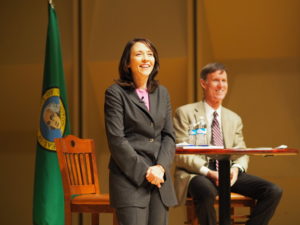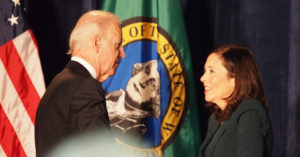She is a product of the flatlands of the Midwest, born in Indianapolis and educated at Miami of Ohio, but Senator Maria Cantwell has summited Mount Rainier, the Grand Teton and Kilimanjaro, and ascended the power structure of Congress to chair the Senate Commerce, Science and Transportation Committee.
Cantwell, D‑Washington, is on a roll of late.
Last summer, for instance, she shepherded the bipartisan CHIPS and Science Act through the last Congress. It’s a law that gives a big financial boost to manufacture of semiconductors in the United States. It is designed to restore United States leadership on a technology pioneered in this country.
More recently, her defense of the great salmon fishery of Bristol Bay in Alaska has drawn attention and commendation.
Cantwell was the first to suggest use of the Clean Water Act to block a half-mile-wide copper and gold mine developers want to build between two of its prime salmon spawning streams. The Biden administration deployed the 1972 law earlier this month, effectively blocking construction of the proposed Pebble Mine.
Although on opposite sides of the battle over oil and gas drilling in the Arctic Refuge, Cantwell and Senator Lisa Murkowski, R‑Alaska, teamed to campaign for construction of new heavy-duty icebreakers for use in Arctic waters.
Russia has a fleet of such cutters. The United States has just one remaining in operation. The ice has broken, so to speak, with construction underway on one vessel and design on a second.
Cantwell, sixty-four, is not one of the usual suspects seen on networks’ Sunday morning talk shows or shouting over talk radio. She gets stuff done by mastering details, quiet work with colleagues and by serving on a trio of A‑list Senate committees where legislation is put together – Commerce, Energy and Natural Resources, and Finance. She is the first Washington senator in more than half-a-century to serve on the Senate Finance Committee.
A bit of history is in order. Between 1953 and 1981, Washington was represented in Congress’ upper chamber by Senators Warren G. Magnuson and Henry M. “Scoop” Jackson. The two Democrats were nicknamed “the gold dust twins.”
Maggie was the state’s provider, rising to chair the Senate Appropriations Committee and securing such projects as the third powerhouse at Grand Coulee Dam, electricity for the Northwest on cold, dark winter days.
Jackson was the master legislator (and defense hawk)… the architect of such measures as the National Environmental Policy Act and the Jackson-Vanik Amendment, which denied trade advantages to the Soviet Union and other countries that restricted immigration.
The Maggie-Scoop model is replicated today.
Senator Patty Murray, D‑Washington, chairs Senate Appropriations, like Maggie, and is the first woman elected president pro tempore of the Senate.

Cantwell is the legislator and policy specialist in a wide range of fields.
Cantwell came to Washington as an organizer of the short-lived 1984 presidential of Senator Alan Cranston, D‑California.
She was elected to the Washington Legislature in 1986, and quickly became a comer, helping write the state’s Growth Management Act while still in her first term. She moved up to the U.S. House of Representatives in 1992.
Defeated in the 1994 Republican landslide, she became vice president for marketing at RealNetworks, making a mint which she invested in a 2000 challenge to Republican Senator Slade Gorton, a member of the Senate Republican Leadership. She narrowly defeated Gorton by a margin of 2,229 votes, a victory which gave Democrats their fiftieth seat in the Senate.
She made her initial mark by bringing to public attention memos and audio tapes by which traders for Enron — the bankrupt, arrogant, and extremely corrupt Houston energy conglomerate — had manipulated electricity prices in the West and privately boasted of their misdeeds. The schemes were entitled “donkey punch,” “ping pong,” “Russian roulette,” “spread play” and sidewinder.”
The Enron implosion showed Cantwell’s way of operating. She masters details. A senior aide was assigned oversight in dismantling of the Tacoma Smelter, long a prime source of Puget Sound-area air pollution. He discovered the boss, too, was meticulously tracking smelter cleanup. With a series of oil train explosions and derailments – one in the Columbia Gorge – Cantwell became a specialist in vapors that can cause a tank car to go up in flames and gritty smoke.
Senator Ted Stevens, R‑Alaska, tried to slip a provision in the 2005 defense authorization bill, opening Alaska’s Arctic Refuge to oil drilling. Cantwell (and Senator Joe Lieberman of Connecticut) caught it and filibustered the bill.
Stevens exploded on the Senate floor, threatening to come to Washington and campaign against Cantwell. The drilling provision was dropped.

Stevens campaigned in Tacoma and raised money for Republican challenger Mike McGavick. Cantwell was reelected in 2006 with fifty-seven percent of the vote. Newly in the majority, Senate Democratic leaders put her on the Finance Committee.
Cantwell has a generally progressive voting record in the Senate. She voted against confirming U.S. Supreme Court Chief Justice John Roberts, against renominating Ben Bernanke to be Fed Chair, and against bailing out the banks in 2008 with TARP, diverging from Murray on each vote. Incurring anger from some Democrats, she supported the 2002 resolution which authorized deployment of U.S. armed forces against the Saddam Hussein regime in Iraq.
The “gentle lady from Washington” can be tough. As Congress wrote the Dodd-Frank Act, tightening regulation of Wall Street in wake of the Great Recession, Cantwell insisted it provide for a consumer protection bureau. She made it a condition for passing the legislation out of the Senate Finance Committee. She became an expert in the manipulation of derivatives, financial contracts that derive their value from underlying assets or groups of assets.
She has prospered even with the Senate under Republican control. Cantwell amended a 2019 public lands bill to put 311,000 acres of Washington’s Methow Valley off limits to mining exploration.
A Canadian firm, responsible for a tailings dam collapse in British Columbia, had wanted to drill in the Okanogan-Wenatchee National Forest.
The Republicans sought to “greenwash” records of two Republican lawmakers, Sens. Cory Gardner, R‑Colorado, and Steve Daines, R‑Montana, with a 2020 vehicle, the Great American Outdoors Act.
Cantwell was, at the time, ranking Democrat on the Energy and Natural Resources Committee. She put into the bill language providing permanent authorization and revenue source for the federal Land and Water Conservation Fund, which buys up endangered wildlands and recreation areas using money from offshore oil and gas leasing. The Fund was a long-ago creation of Senator Jackson.
Cantwell made a trip to China after her first reelection, coming away worried that the Middle Kingdom was getting a jump on twenty-first century “clean” energy technologies, solar panels and wind turbines. She has since been a relentless advocate and was a force for including clean energy subsidies as a major provision of the Inflation Reduction Act.
Cantwell is no gladhander. She tours the Washington economy when back home, insisting on copious briefing. She is an exacting boss.
One legislative intern, set to leave after a summer’s work, discovered that two senior aides were departing the same day. Such were tensions between candidate and her communications staff, during Cantwell’s 2000 campaign, that body aide Gavin Lodge gained a nickname “the human firewall.”
She does get around and gives priority to this Washington.
One recent spring, Cantwell passed up the Gridiron Dinner in Washington, D.C., in order to spoon out potato salad in the chow line at Pacific County Democrats’ annual crab feed, the oldest continuous political event in the state.
In today’s bitterly divided Congress, the empty drums bang loudest. A majority of the Senate’s nineteen women, however, continue to collaborate and demonstrate adult behavior. Cantwell doesn’t make noise. She makes policy.
She may burn the candle from three ends, but Cantwell is a baseball enthusiast. She became the first lawmaker “of the female persuasion” – to use Dwight Eisenhower’s notable phrase – to play in the annual congressional softball game, which raises money for charity and pits Democrats against Republicans.

